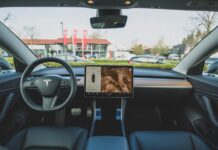Non-maintenance of electric car tires can seriously affect the tool, in case it is not inflated properly, is not intended for the car, or is not original.
This is the part that many drivers may overlook, as tires generally last a long time, are estimated to be years, and don’t require much maintenance. But even if they continue to run for a long time without complaint, your electric car’s tires matter a lot more in terms of performance than those of a regular gasoline-powered car, and that also affects range – defined as the distance driven on a fully charged battery.
In this report, dear reader, we will show you how electric car tires can affect range and performance.
How do electric car tires affect distance and performance?
1- Badly inflated tires
The easiest way to negatively affect the range of your electric car is to drive it on underinflated tires. Even a few degrees less on the tire pressure gauge can make a significant difference in rolling resistance and reduce efficiency. Air pressure in tires can vary significantly over time and as air temperatures change, so it’s recommended that you check the air pressure in your car’s tires at least once a month.
And while you add the necessary air to the tires of your car, you can also check the length of the markings on the tire surface, which should not be less than 1.6 mm. If it is less than this, it is better to buy new tires.
2- The use of non-designated electric car tires.
The tires that the company originally used for your car are often specially developed to fit the car, which means that the characteristics of the tire such as noise level, grip strength, and rolling resistance have been modified to fit the specifications of your electric car. The car tire is not made specifically for your car, the manufacturer’s choice of this type means that it is the best for a group of cars made by the company, including your car.
If you decide to buy a different type of tire than the company uses to improve performance or because you think certain types will last longer, remember that this decision will get you into trouble.
For example, using tires with better road grip may actually improve the car’s performance in terms of acceleration and stopping, but it may increase the noise level annoyingly and may reduce the distance the car travels with a fully charged battery ( range), due to differences in the structure of the frame, the materials from which it is made, the length of the etching on the outer surface and other factors.
On the other hand, if you are looking for low-wear tires that last longer, you may find that the grip of the wheels on the road has become poor or the stopping distance when using the brakes has become much longer.
Choosing tires for electric cars that are different from the original type of car requires you to allocate enough time to do the necessary research until you find the right tire for your needs. The car company for your car has undergone extensive testing and development and research stages to meet the requirements of the particular car.
3- Use tires that are not primarily intended for electric cars
Sure, no one cares about saving money, especially if it seems like you can get a good deal that offers you more benefits for less money, but when we talk about car tires in general and electric car tires in particular, the difference is often in the details, it may seem like you have two tires that are so similar that you can’t tell them apart, but they can be completely different.
Even when there are no significant differences, the impact of tire quality and specification on electric cars is much greater than its effect on ordinary cars with gasoline or diesel engines, and this is because electric cars transfer about 80% of their power to the wheels, whereas they achieve no more than 25% of the power produced in a conventional car towed to the road because most of this power is converted to heat and lost through the transmission system.
Thus, any change in tire rolling resistance in electric cars will have a direct impact on range, three times more than in gasoline and diesel cars.





